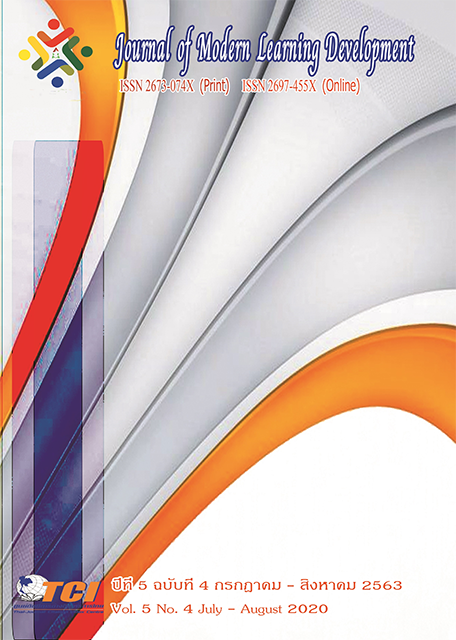The Process of Seeking Philosophical Truth as Appeared in Kesaputta Sutta
Main Article Content
Abstract
The objectives of this research were: 1) to study the philosophical process of seeking truth; 2) to study the process of seeking truth that appears in the Kesaputta Sutta; 3) to analyze the philosophical process of finding the truth that appears in the mentioned Sutta. This study was carried out by means of documentary research used in collecting data from primary and secondary resources and afterwards the gathered data were interpreted by using descriptive reasoning methods.
The results were as follows: There are two major methods of the process of seeking truth in a philosophical approach: 1) the pursuit of truth through sensory contacts or experience philosophically called the inductive pursuit of truth in other words it is to seek the truth from small experiences to the conclusion of universal truth; this is a method of finding knowledge of materialism; 2) the rational search for truths which philosophy calls it the deductive pursuit of truth; it is the quest for universal truths to summarize the sub-truths; this is a way to find the truth of the group of idealism.
The process of seeking truth as it appears in the Kesaputta Sutta includes: 1) be not led by report, 2) tradition, 3) hearsay, 4) authority of texts, 5) mere logic, 6) inference, 7) considering appearances, 8) the agreement with a considered and approved theory, 9) seeming possibilities and 10) the idea ‘This is our teacher’. After these stages, critical thinking is used to make a decision to believe.
There are two processes of philosophical truth finding in the Kesaputta Sutta: 1) the truth seeking based on experience, namely the use of internal sense-fields (ajjihattikāyatana) including eyes, ears, nose, tongue and body and external sense-fields (bāhirāyatana) including visible objects, sound, smell, tastes, physical contact and mind object; in philosophy, this is called the inductive pursuit of truth and in the Kesaputta Sutta, it refers to items 1-4; 2) rational search for truths, including the use of reasoning to search for truth; in philosophy, this is called deductive pursuit of truth of idealism and in the Kesaputta Sutta, it refers to items 5-10 above. Finding the truths in the Kesaputta Sutta is the use of both the inductive method(paratoghosa, another’s utterance) and deductive method (yonisomanasikāra, proper attention) in critical thinking before making a decision to believe.
Article Details
References
จำนงค์ ทองประเสริฐ. (2514). ปรัชญาประยุกต์ชุดอินเดีย. กรุงเทพมหานคร: เกษมบรรณกิจ.
ชาญณรงค์ บุญหนุน. (2540). ทฤษฎีความเป็นจริงในพุทธปรัชญาเถรวาท. วิทยานิพนธ์อักษรศาสตรดุษฎีบัณฑิต. บัณฑิตวิทยาลัย: จุฬาลงกรณ์มหาวิทยาลัย.
บุญมี แท่นแก้ว. (2543). ปรัชญากับศาสนา. กรุงเทพมหานคร: สำนักพิมพ์โอเดียนสโตร์.
พจนานุกรมฉบับราชบัณฑิตยสถาน พ.ศ. 2554. (2556). (พิมพ์ครั้งที่ 2). กรุงเทพมหานคร: ราชบัณฑิตยสถาน.
พจนานุกรมศัพท์ปรัชญา อังกฤษ-ไทย ฉบับราชบัณฑิตยสถาน. (2548). กรุงเทพมหานคร: ราชบัณฑิตยสถาน.
พระธรรมโกศาจารย์ (ประยูร ธมฺมจิตฺโต). (2552). ปรัชญากรีก บ่อเกิดภูมิปัญญาตะวันตก. (พิมพ์ครั้งที่ 7).กรุงเทพมหานคร: สำนักพิมพ์ศยาม.
พระมหาบุญไทย ด้วงวงศ์. (2540). การใช้เหตุผลทางตรรกะในพระไตรปิฎก. ปริญญาศิลปศาสตร์มหาบัณฑิต สาขาวิชาปรัชญา. บัณฑิตวิทยาลัย: มหาวิทยาลัยเชียงใหม่.
พระเมธีธรรมาภรณ์ (ประยูร ธมฺมจิตฺโต). (2533). พุทธศาสนากับปรัชญา. กรุงเทพมหานคร: อมรินทร์ปริ้นติ้งกรุ๊ป.
มหาจุฬาลงกรณราชวิทยาลัย. (2539). พระไตรปิฎกภาษาไทย ฉบับมหาจุฬาลงกรณราชวิทยาลัย. กรุงเทพมหานคร: โรงพิมพ์มหาจุฬาลงกรณราชวิทยาลัย.
สมภาร พรมทา. (2542). พุทธปรัชญา : มนุษย์ สังคม และปัญหาจริยธรรม. กรุงเทพมหานคร: จุฬาลงกรณ์มหาวิทยาลัย.
เสาวนีย์ พงศกรเสถียร. (2557). การศึกษาวิเคราะห์แนวคิดเรื่องญาณวิทยาในธัมมปทัฏฐกถา. ปริญญาพุทธศาสตรมหาบัณฑิต สาขาปรัชญา. บัณฑิตวิทยาลัย: มหาวิทยาลัยมหาจุฬาลงกรณราชวิทยาลัย.
เอกวุฒิ บุตรโคษา. (2553). การศึกษาเรื่องประโยชน์นิยมในพุทธปรัชญาเถรวาท. สารนิพนธ์ศาสนศาสตรมหาบัณฑิต. บัณฑิตวิทยาลัย: มหาวิทยาลัยมหามกุฎราชวิทยาลัย.
Del Kiernan-Lewis. (2000). Learning to Philosophize a Primer. Belmont: Wadsworth.


